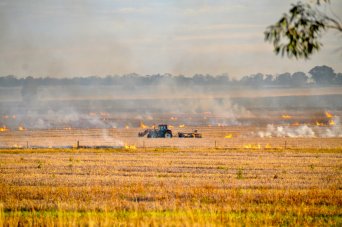- About
- Topics
- Picks
- Audio
- Story
- In-Depth
- Opinion
- News
- Donate
- Signup for our newsletterOur Editors' Best Picks.Send
Read, Debate: Engage.
| topic: | Political violence |
|---|---|
| located: | Ukraine |
| editor: | Katarzyna Rybarczyk |
The Russian invasion has had devastating consequences for the people and the environment of Ukraine and risks continual destruction now that the country’s farmlands are plagued by Russian landmines. According to Ukrainian Prime Minister Denys Shmyhal, the Russian war has created a minefield of 250,000 square kilometres in Ukraine, making it “the largest minefield in the world.” With vast areas of agricultural land contaminated with unexploded ordnance, farming has become a high-risk activity, crippling the country’s agriculture sector.
Although Russian troops have withdrawn from some of the previously occupied areas, they have left behind thousands of landmines that make farmland too dangerous to cultivate. HALO Trust, an NGO that removes debris left behind by armed conflicts, reported that “many of those injured or killed by anti-tank mines left behind in rural areas around Kyiv were tractor drivers working the land.”
As the agriculture sector provides a livelihood to around 13 million Ukrainians, landmines not only pose a direct threat to the lives of farmers, but also deprive them of means to earn a living. A recent report published by the FAO revealed that "25 percent of the Ukrainian rural population involved in agriculture stopped their activities or reduced their output due to the war. The situation is much worse in the most agriculture-dependent regions of Ukraine, where over 40 percent of rural families are affected.”
The issue is not contained to region: landmines risk serious implications for food security beyond Ukraine’s borders. Ukraine is one of the world’s largest wheat exporters and it plays a major role in supplying grains to the global market. Countries of the Middle East and North Africa (MENA) - many of which are battling their own crises - are often heavily dependent on Ukrainian exports. Because of that, the supply disruptions could result in pushing millions of people into hunger.
Data published by the Ukrainian agriculture ministry revealed that so far in the 2022/23 season, Ukraine has exported almost 23.6 million tonnes of grain, around 10 million tonnes less than at the same time last year. With the war still ongoing, there is a possibility that the Russian military will continue to place mines, which could mean an even more scarce harvest next season.
So that Ukraine can stay focussed on fighting to reclaim its freedom, the international community should assist it with clearing the mines. Financial aid is of crucial importance, but Ukraine’s deminers are in urgent need of specialised equipment. Tymur Pistriuha from the Ukrainian Deminers Association pointed out that “his deminers lack metal detectors.” The West must urgently deliver more of these life-saving devices along with bomb de-arming kits.
Officials estimate that demining Ukrainian territory will take at least a decade; in the meantime, the international community should ensure that Ukrainian farmers whose ability to work has been compromised can access grants and receive assistance with finding alternative employment.
Russian landmines must be removed from Ukrainian territory without delay to avert long-term consequences to the global food system and ensure that farmers do not have to fear for their safety.
Photo by David Maunsell

